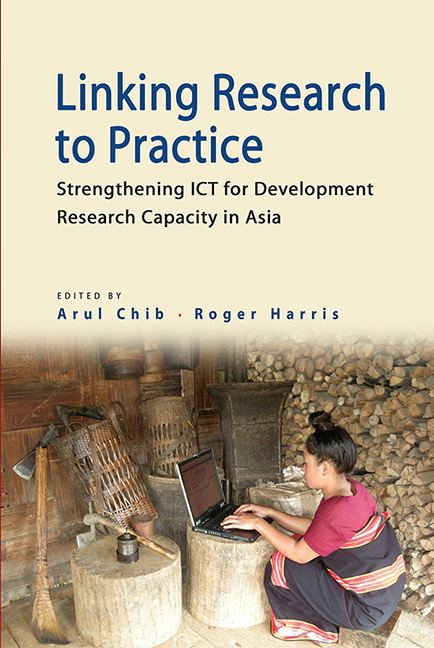Book contents
- Frontmatter
- Contents
- List of Tables
- List of Figures
- Foreword
- Preface
- Acknowledgement
- SECTION I MANAGEMENT PERSPECTIVES: INSIDERS' THOUGHTS ON THE PROGRAMME
- SECTION II RESEARCH PERSPECTIVES: THEORETICAL REFLECTIONS BY EXPERTS
- 5 ICTD Praxis: Bridging Theory and Practice
- 6 Messy Methods for ICT4D Research
- 7 Ethics and ICTD Research
- 8 ICTD Curriculum Development and Professional Training: Mainstreaming SIRCA Research Models
- 9 Multi-stakeholder Perspectives Influencing Policy-Research-Practice
- 10 From Production… To Dissemination… To Adoption
- SECTION III RESEARCH OUTPUTS
- SECTION IV SYNTHESIS AND CONCLUSION
- About the Contributors0
- Index
5 - ICTD Praxis: Bridging Theory and Practice
from SECTION II - RESEARCH PERSPECTIVES: THEORETICAL REFLECTIONS BY EXPERTS
Published online by Cambridge University Press: 21 October 2015
- Frontmatter
- Contents
- List of Tables
- List of Figures
- Foreword
- Preface
- Acknowledgement
- SECTION I MANAGEMENT PERSPECTIVES: INSIDERS' THOUGHTS ON THE PROGRAMME
- SECTION II RESEARCH PERSPECTIVES: THEORETICAL REFLECTIONS BY EXPERTS
- 5 ICTD Praxis: Bridging Theory and Practice
- 6 Messy Methods for ICT4D Research
- 7 Ethics and ICTD Research
- 8 ICTD Curriculum Development and Professional Training: Mainstreaming SIRCA Research Models
- 9 Multi-stakeholder Perspectives Influencing Policy-Research-Practice
- 10 From Production… To Dissemination… To Adoption
- SECTION III RESEARCH OUTPUTS
- SECTION IV SYNTHESIS AND CONCLUSION
- About the Contributors0
- Index
Summary
There is nothing more practical than a good theory.
Kurt Lewin (1952)INTRODUCTION
This chapter elaborates on the theoretic dimension of my engagement with the Strengthening ICTD Research Capacity in Asia (SIRCA) Programme.
A distinctive feature of SIRCA is the appointment of mentors along with principal investigators in the research process. When enlisted into the programme as a mentor, amongst the many assumptions that I harboured was that research should lead to theory and that theory should result in further research. After all, should not a research capacity building programme help develop a robust theory building agenda? Should not the programme provide incentives to researchers to construct and validate theory?
In August 2009, I was asked to share my thoughts on these assumptions with the first batch of SIRCA grantees, now considered principal investigators (PIs) of information and communication technology for development (ICT4D or ICTD) phenomena. These assumptions, however, give rise to two issues.
AN ICTD THEORY BUILDING AGENDA?
The first issue deals with the nature of the field. ICTD has originated from, has been borne out of, and has been thriving in practice. For more than half a century, ICTs from the humble rural radio to the most sophisticated knowledge networks have been applied in the service of national development and, more recently, in support of the Millennium Development Goals (MDGs), generally without adopting solid theoretical frameworks or foundations. ICTD theory came ex post facto, more of an afterthought to help explain processes and outcomes, rather than ex ante, to be validated by research. It was hardly used as a basis for planning and practice. The dominance of applied research, mostly attendant to project monitoring and evaluation, attests to this. So does the preponderance of ICTD fugitive papers or grey literature produced by international development agencies over scientific articles published in technical journals.
- Type
- Chapter
- Information
- Linking Research to PracticeStrengthening ICT for Development Research Capacity in Asia, pp. 49 - 57Publisher: ISEAS–Yusof Ishak InstitutePrint publication year: 2012



